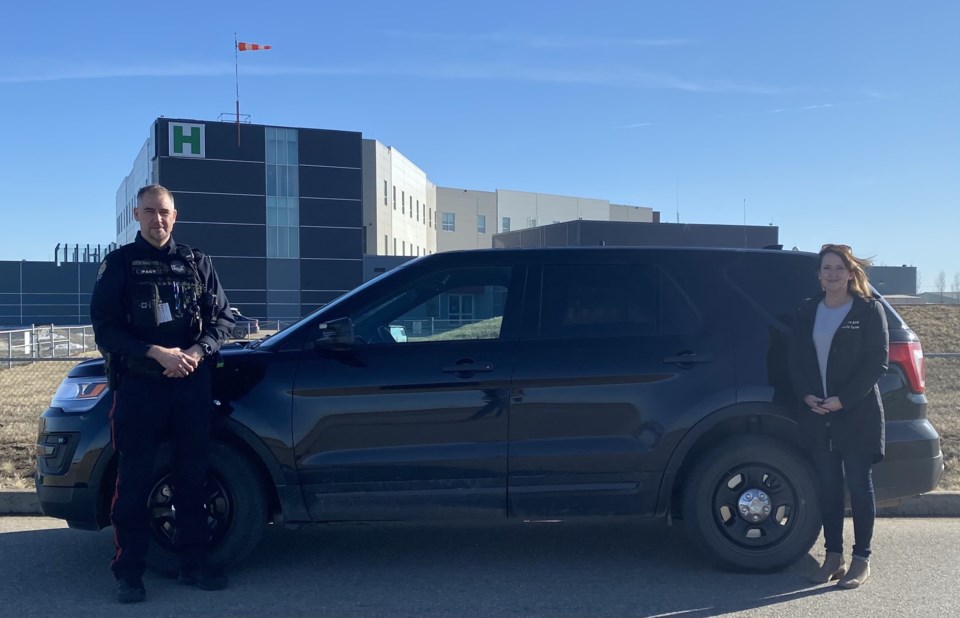Social worker Tanya Morland has been with the Moose Jaw Police Service’s Police and Crisis Team (PACT) for over two years and has seen how the unit has changed residents’ perceptions about police.
“What I’ve noticed coming in from a different agency (and) working with officers is, they’re so good at their job and they really care about the people they’re working with,” she said on a recent podcast episode of The Hope Collective, an initiative of Journey to Hope.
“It’s unfortunate that there’s this negative (perception) … ,” she added. “What’s happening with this team is it is breaking down some of those barriers. People are now seeing (partner Const. Shawn Mohle) and how Shawn is talking to them and what Shawn’s offering them and coming at it from a different way. And then they connect the police uniform in their mind a little different.”
Teaming up
Mohle has been an officer for 15 years, while Morland has worked for various health agencies in Moose Jaw, including mental health and addiction services.
The two have been PACT teammates since October 2018.
“We use humour throughout our day … so that helps us,” said Morland. “Twelve hours in a car is a very long time.”
The Police and Crisis Team comprises two full-time groups, each with a police officer and a mental health professional, explained Mohle. Both groups provide coverage seven days a week, with their hours either 7 a.m. to 7 p.m. or 9 a.m. to 9 p.m.
When responding to a crisis or mental health situation, a PACT officer’s role is to ensure the scene is safe, protecting the mental health worker who is assessing the individual, Mohle said.
He added that police officers would have helped residents in crisis before PACT’s creation, which usually meant taking them to the hospital. However, with a mental health professional on the team, PACT units meet with residents and determine if they can access other services besides the hospital.
Finding different supports
“That looks different depending on the situation. Oftentimes, we’re able to connect with other supports in the city like social services, peer-support workers, family, friends, other supports that these folks might be able to access that could keep them in their natural environment,” said Morland, noting the goal is to divert unnecessary visits to the ER.
Sometimes residents do need to visit the hospital since there are no other options, she added. So, she and Mohle work with psychiatrists and emergency room staff to ensure that individuals’ experience is less traumatic.
Interagency teamwork
One reason PACT works well is because of the collaboration between community agencies, Morland said. There have likely never been two agencies under one roof before intending to help individuals.
“We have to be mindful of protecting people’s information, but we have to remember we are professional and a team,” she added.
Providing extra attention
Anyone who needs PACT’s services can call the Moose Jaw Police Service and speak to a dispatcher, who then directs the call to a PACT unit, Mohle explained. If those members are not working, patrol officers will respond and determine what is happening. PACT members can then follow up the next day.
“Plus, it’s just so great for our team … . We can be with somebody for 20 minutes, or we can be with someone for two hours,” Mohle added.
These follow-ups are important since members want to prevent individuals’ mental crises from escalating, said Morland. If people decline to use mental health services, PACT members can return regularly and see how people’s wellness is until it improves
“One thing we focus on — now that we have two full-time teams — is the outreach piece … ,” she continued. “Whatever (the situation) is, we go visit them. We don’t stay long. It’s quick, so the person knows there’s somebody out there who cares about (them).”
Added Morland, “Once we show up, we are in an unmarked vehicle because of privacy, and we’re always thinking of the respect and dignity of that person … .”
Pandemic calls
PACT teams have responded to more calls during the pandemic since many residents have been cooped up in their homes for months, said Mohle. Police Chief Rick Bourassa saw the need for two full-time teams during this time and directed money to create a second unit.
A challenge that members faced was other community agencies changed how their practices because of lockdown restrictions, which meant PACT units were following up with individuals constantly, Morland said. Yet, those same agencies were forced to become creative in how they offered their services.
“Things look very different, and I take my hat off to all of that and extra thanks to them because now we can (use) other agencies; it just looks a little bit different,” she added.
A thankful community
Residents who used PACT regularly reach out to Morland and Mohle to update what is happening in their lives, such as finding a job or buying a house.
“Seeing people complete detox or complete treatment and we getting updated about that, that (also) means a lot to us,” said Mohle. “The smallest things are the biggest things for us.”
Words of hope that Morland offers people are, “You got this … things will get better. Don’t suffer in silence. Reach out. There’s somebody listening somewhere.”




